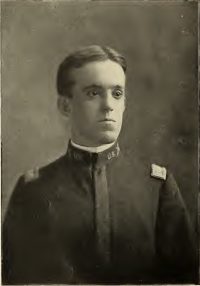DEAR CHAUNCEY: Your letter dated June the 7th reached me on June 23, while we were camped near Blockhouse number Cinco, not far from the Baligbalig [Balic-Balic] road which goes into Manila from the trenches. The next day being one of my most memorable of days, —my birthday,—I had made arrangements to visit the city and have a little dinner with a few gentlemen at the Army and Navy Club, 38 Calle Marina Erminita (of which I am a member), but we got orders to pack up and move. So our battalion under charge of Captain Oltenhead moved about four miles to the north, and we have been here since then. The rainy season is upon us, and it rains hard every day late in the afternoon for two or three hours. Last night it started to rain and it is raining very hard just at present. We are camped in snug tents three hundred yards in front of the Cabocan [Caloocan] station. There is no town here, but there are four or five car shops, and some large nipa barracks are being erected here for the use of a regiment or so during the rainy season. From Cabocan [Caloocan] the railway goes into San Fernando, which is about fifty miles from Manila. Our troops hold this last city, which is one of the most important points in the island of Luzon. Last year there was heavy fighting here and all along to San Fernando. Aguinaldo is entrenched about San Fernando and has tried to force our lines there, but he cannot last long and has few sympathizers in the island. There are a number of islands in the Philippine group, but the only trouble is in and around one or two provinces of the island of Luzon. This camp is almost five miles by rail from the city, and the trains run like Cape Cod trains, —once a day. The steamer did not stop at Honolulu, but we were hustled across as fast as possible and only camped a day in the city before going into camp near part of the trenches which guard the city on the land side for eight or ten miles. The volunteers are being shipped home as fast as possible. The news here of operations, etc., oftentimes does not appear in the local papers until four days after they occur, so that you get the news quicker than we do, by means of the cable. By cracker, how it do rain, as the Amherstites say; but I have got a ten by twelve wall tent, and the fly sheds water pretty well. I sleep on a “gold medal” cot, —that is, a canvas cot which folds into a hand bundle and is an excellent thing for the field. Besides this, I have three blankets, an old blackboard as part of a floor, a candlestick consisting of an empty (too bad) pint bottle of infandel claret, my dress suit case, which still holds together, pail, wash basin, soap (I thought I would mention it, although it is not often used by certain classes of the population), canteen (which gets very cool and sweet at night), haversack, a bolo or native knife (a relic of our Bacoor campaign, June 13), field glasses, and a blanket roll. This roll is a heavy piece of canvas about seven feet square and arranged to be used as a hammock, shelter, and bed; it is an indispensable article for an officer to have in the field because one’s blankets, cot, and clothes can be rolled up in it. Lastly I have a fine rain coat and a pair of rubber boots which are just the thing in such a climate. I am writing this seated on my cot, and using the seat of a fine cane chair which one of the men found in camp and gave to me. You can picture to yourself an individual perfectly healthy and ready for anything. I have seen Dalton several times. We took our examination for promotion together. All the officers are well with the exception of Donovan and Connolly, who are wounded.

Edward Avery Bumpus
(June 24, 1875 — September 28, 1901). Lieutenant in the U.S. Army from Massachusetts. Killed in action in the Philippines.
All Posts